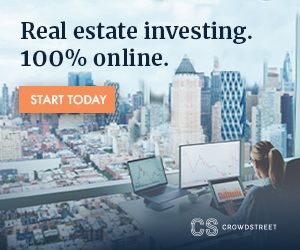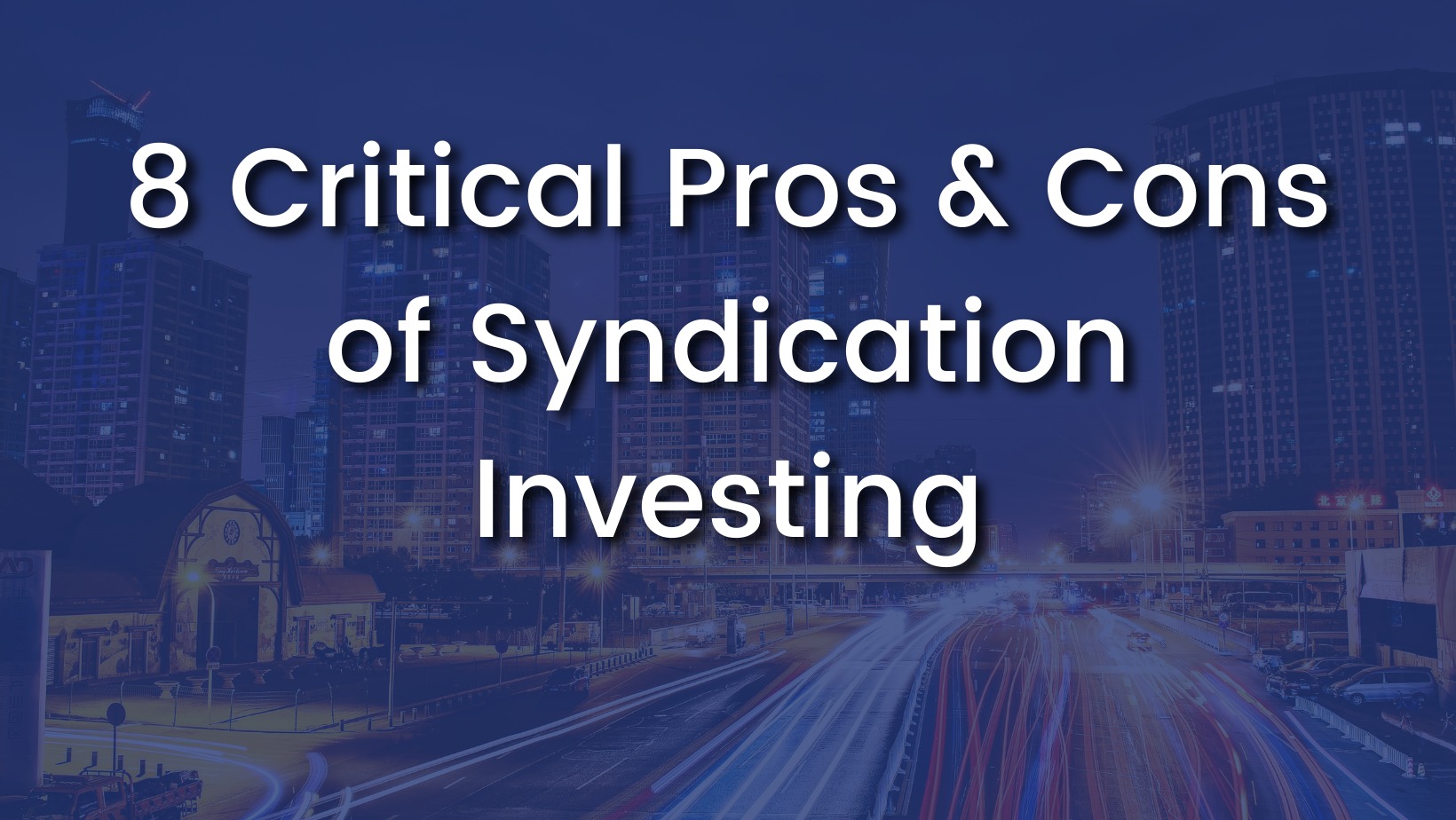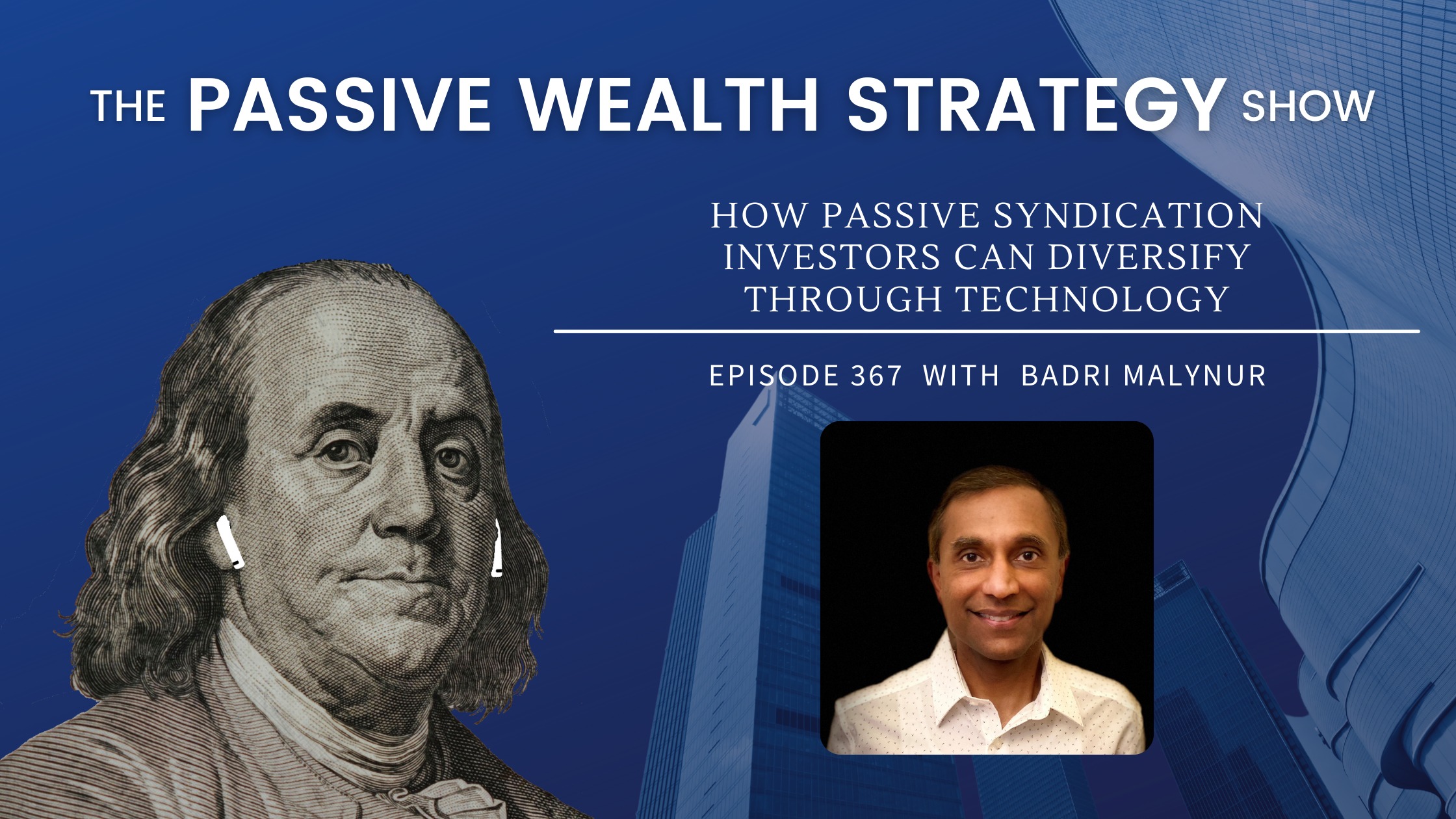
How Passive Syndication Investors can Diversify through Technology with Badri Malynur
Badri thank you for joining us today.
Hey, thanks, Taylor. A pleasure to be with you.
It’s been great talking with you and I look looking forward to learning more about your platform and our listeners. Learning more about your technology I think is gonna help grow the real estate syndication space and get more people away from wall street for those out there who don’t know about you and what you do.
Can you tell us about your background and your business?
Sure. Let me give you a brief background about myself before we go into an investor. I am an entrepreneur at heart, but I did start my life in corporate America. I have a master’s in computer science and an MBA in marketing. And I was managing a team of several hundred people across five continents on the plane all the time.
that quickly got old. So quit corporate America, 15 years back started a company that had a couple of exits. And then this is my latest venture. And by the way, just so that, I really can speak from a variety of investment perspectives. I invest in a wide range of assets, including I don’t know, venture capital.
I’m an angel investor in 30 companies crypto hedge funds stock options, bonds commodities, but we’ll focus on real estate for this show. And so the latest venture is an investor. I would like to talk to you about it, and it’s a platform that allows investors to build diversified portfolios. So the problem we have today, Taylor, is that syndication deals are great.
I’m assuming your audience is already familiar with the concept of syndication. Yeah. Yeah. But the problem we were trying to solve is for somebody who was just starting. 50 or a hundred thousand dollars is a lot of money to put in a deal. And how do you know the deal you’re picking? Especially if you’re starting, you’re never really sure.
Is this the deal, right? If it goes out, that’s a lot of money for people to lose. And so what we built is a platform where you think of it, a stock brokerage account for real estate syndication deals. So you put 50 K in a fund and it’s a customizable fund, which allows you to pick and choose deals.
That’s what we do. That’s whatever does. Awesome.
And that customization from what I’ve, learned here is maybe the if you will, the superpower of what you’re developing or the, maybe the secret sauce, I don’t know, but, dig into that, if you would for us and, know, tell us what can be customized about, all the funds that people invest.
Perfect. Perfect. That’s a great question. So yes customizability is our sacred sauce and at the risk of being wrong, but I would be happy to be corrected. We are the world’s first and only platform that supports what we call a customizable fund. So a customizable fund is more like a buffet.
When you go to a buffet and you say, I like this dish. I don’t like this dish. You pick and choose. So we created our first fund and I’ll tell you about our platform has now been extended for other funds, but we created our first fund where we invest in a wide range of asset classes. We do multifamily, we do self-storage.
We do senior living. We do student housing, we do retail and we also do. Two types of things we do both syndication deals and we also do loans, hard money loans. So what we are trying to do is offer the stock-bond equivalent. What happens if you go to an investment advisor? Not everybody goes to an investment advisor.
The typical question is, oh, do you want an 80% stock allocation, 20 person bond allocation. So we all offer that equivalent in real estate. So you can say, Hey, I want 80% in syndication deals, which is more like stocks. And 20% in loans which is more like months where you get fixed interest and you don’t get long-term capital gains and capital depreciation and appreciation. So that’s what we do here. So nice.
So one of the big things for passive investors who are. Starting in the space or getting more diversified in this indication space, you get diversified across all these deals, and then come to the end of the year, the next tax year, you wind up with a big fixed stack of K one S and maybe some of your K one S is late.
Hopefully not, but that can happen. Whereas, through your portal, I understand that’s different. Can you walk us through the K one situation?
That’s great. To me, I’ll be honest with you, Taylor, the only people who are happy getting a bunch of CA is your accountant that’s right. That’s right.
So we completely avoid that. The beauty of what we are built is that we have spent hundreds of thousands of dollars and years developing this. Even if you invest in 20 different days, let’s say you invest in 10 different syndication deals, three multifamily, a couple of self-storage, one industrial LA.
And let’s say 10 or 15 different loans. We consolidate all of this information and we give you a single K one at the end of the year. And that’s a lot more complex than it might seem. But you from being an engineer and from a technology background, I think you’d appreciate the math and the complexity behind it.
And we have gone through two full, like an accounting life cycles and our customers love it. So they don’t want to mark with multiple CA ones. They have a diversified portfolio. And we have a portal where you can log in just like you login to fidelity or a TDR trade, and then you’ll see how each slice is doing.
So we are trying to bring the top brokerage experience to real estate syndication investors.
Interesting. So I I like that and I think not. I think more passive investors need to ask the question of their sponsors, how good are you at getting K one S out on time and in the right, way.
And I appreciate that you’re going after that now on the, there are two sides of the equation, right? You have to have investors, then you have to have sponsors right. Doing deals through the platform. Yeah, I’d also like to learn more about the advantages to sponsors, compared to the way they, Used to do it if you will.
Okay. Good question. So we built our initial fund called Aeriel LP for passive investors, and then we pivoted a little bit because what people found is, Hey, I love your customizable fund idea. Sponsors came to us and said, why don’t you, why don’t you allow us to create our funds? So our vision then changed a little bit.
We still do our fund and we still get passive investors who can put $50,000 in one fund. But then. Invest in 10 or 15 or 20 different deals, but we opened up this platform for other people to create their customizable funds. If you look at what people do, there are fund administrators. There is investment management software.
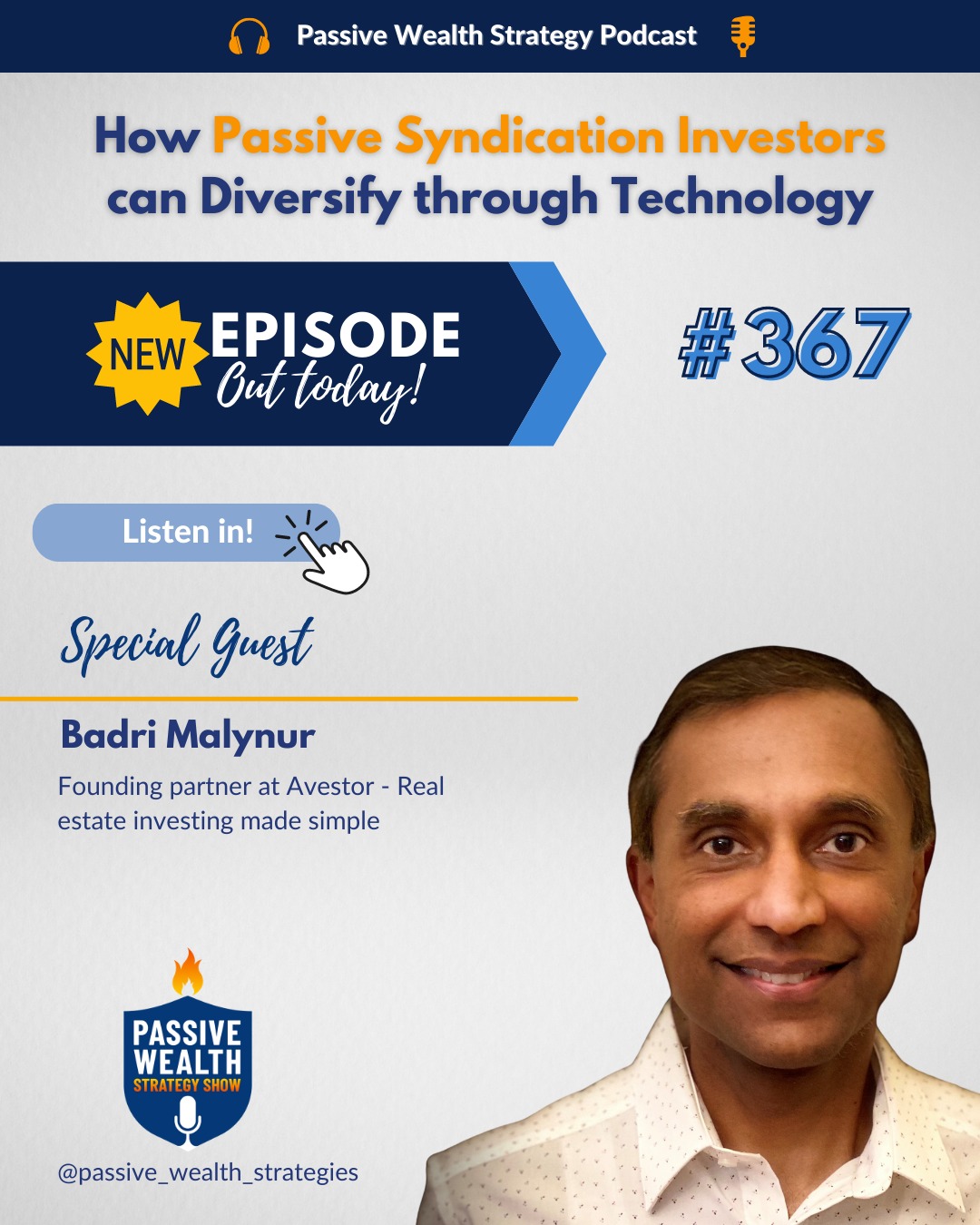
How Passive Syndication Investors can Diversify through Technology with Badri Malynur
There are a ton of syndication portals out there. And there are marketplaces. We are trying to combine all three elements for sponsors. You have your marketplace and especially many of the marketplaces are not very friendly to mid, to small-size sponsors. So we provide all three elements where we help them start the fund.
We help them with the legal aspects of creating the LLCs, the G a general partner, LLC. We help them with CC registrations. We help them with accounting taxes. So think of us as a business partner for these sponsors to help create a fund. And from a passive investor perspective, we want to create a huge range of funds.
We are talking mobile, home parks land development vineyards self-storage student housing. So you can come to the platform and be able to say, I want to diversify into this area and there be fun for you there. So that’s our kind of our vision. Cool. Cool.
One of the things I always think about in new product development. No, no matter what it is. And you guys aren’t, I dunno if you’d, I’d say you’re new anymore, right? It’s established and you’re, growing is, there are always things that. You incorporate and end up being less popular than you expected ’em to be.
And then some things come up that maybe you didn’t think of in the first place that, Hey, our users want this particular feature. So we’re gonna add that in there. And that’s just a normal part of developing a business, that’s absolute. Okay. Absolutely. Okay. So what out of those two, comes to mind? I just wanna field that question, how’s that happen? What comes to mind?
We have a very agile development team it’s all about. We don’t say no to a sponsor, as long as it’s legal, each sponsor comes to us. Yeah, we don’t want to cross that line. Each sponsor comes to us and says, Hey, this is my business model.
And so we adapt the PLA platform around it. Our goal and hope are that. If we do 10, 15, 20, 30 models, then we’ll be able to adapt to any business model provided by the sponsor. Let me give you some examples of funds, which are being created on our platform. There was a hard money lending fund before he created the fund on the platform.
He was giving entire hard money loans to people. And so let’s say in California, you can’t get a property for less than $400,000. So, one loan is 300 of 400 K or even in the Midwest, right? A hundred, 200, 2 50 people feel uncomfortable paying that much in a loan. And so what our platform allow him to do is allowed him to slow ice into much smaller slices.
People feel a lot more comfortable saying, Hey, let me put five or 10 in this loan back by the hard, the. And then we have capital razors who like to use our platform without becoming registered as a broker-dealer. They can use the fund to raise capital where they go and say, Hey, we’ll raise a million or two for you.
Give us some preferred terms and maybe they keep some of the preferred terms. And some of it that pass on to the investors. So we literally can accommodate a huge range of business models. And use a range of asset classes. So I believe they have something unique here. So Yeah.
I know folks who are, using your platform to build their funds from the sponsorship side.
I know it’s being adopted and I wonder from the sponsorship side what kind of, let’s say like KPIs or anything are available so that, know, folks can dig in and see, maybe I need to improve this area or, whatever, when they’re, feeling a fund to investors, what kind of like analytics can a sponsor?
Yeah, we provide an extensive set of reports. Including how often do people log in? How often do they spend time on the platform? How is a person’s PLA investment diversified and how does it keeps track of what they said they want to do. It’s I think I gave you this analogy before the podcast.
What we help people do is build the equivalent of, for stock-bond portfolio within the fund. And so we have tools that help sponsors keep track of that and make sure that they’re on top of their goals in terms of the mix between syndication deals and hard money loans. If they’re doing both in the fund, so we have a variety of analytics for that.
So nice. So this is a tough question, right? And then I don’t mean it to sound rude, but I want to, put it out there all, no holds BARR, not intended that way. But, so if there’s a, there funds fun on the platform. What happened if, what happens if Ava goes outta business and we’ve got money invested in this fund, but. What happens.
Okay. So we want to separate from a passive investor perspective. You’re not investing in an investor, you’re investing in a wholly-owned subsidiary of an investor, which owns all the assets. So that’s a great question. And we have plans in place for an orderly transition if a goes out of business.
Now I do not know if they would be able to invest in new deals because that depends on the status of the platform, but we have all plans in place where the assets are in LLC. And passive investors are a member of the LLC. And they just have to wait until the deal exists and the money comes back to them.
So that’s absolutely something we take into account. We don’t think we will. I think we are growing very rapidly. We are getting ready to do a VC round, but you gotta plan for all unexpected things. The good question.
Hey, it’s something that, it’s a question. I think it’s responsible to ask if we’re investing with a syndicator and it’s a.
One-man band. That’s a key man right there. And if it’s a one-man-band there or the platform we need to ask what happens if that person goes away.
Badri So you’re not investing in the platform you’re investing in S say, which owns all the assets through the platform.
Yeah. Yeah. So if there’s a line of communication that can be held because of what, if, know, I invest through the platform with a sponsor, but the sponsor doesn’t know how to get in touch with me. If the, if the platform’s outta the picture, We have to get back in touch and, make sure all our data is still available. I just wanted to flesh that out, yeah.
Make that we make that public and we have an orderly transition in place in an emergency like that.
Good. Good. I’d also, just to learn more about you and your, entrepreneurial experience, you have a successful track record as an entrepreneur, and, I just wanted to learn about how you made that transition in your life.
You said you had a long corporate career and eventually. Decided you wanted to get out of there. Let’s dig into it and learn more about, what you did as an entrepreneur you had the exits and then got into Ave as you’re in now. So run us through your background.
I’m just so curious, To be honest, real estate was a big factor. Not real estate as in multifamily, syndications, and things like that. We bought a fourplex and a triplex, which provided some nice cash flow. It was just nice to have that in the bank. And, before I quit my corporate job, we paid off any loans.
So we knew at least that money was coming in. Not that it was huge amounts of money, but it was enough for maintaining your lifestyle and some certain amount of living expenses that so real estate I’m thankful for real estate in helping me transition from The corporate job to the entrepreneurial journey.
And I was lucky. As soon as I quit my corporate job the first company we started, a training company took off pretty fast, and then both, and we also started a recruiting software company which had not, it was not as spectacular, but it did have a decent exit. But since it’s a real estate show, I can truthfully say that real estate helped me transition which makes the transition from corporate to entrepreneurial real life, awesome.
That’s great. And you mentioned yours. Potentially heading into, know, rounds of VC funding for Ave. And, I’m sure there’s information you can’t go into here. But just, I’d like to learn about, the preparations for that. And as you’re thinking about, I don’t know if your past businesses, if you work with VCs or not, but you just wanted to dig into that. And what you’re thinking about now, as prepare to work with VCs.
So far Ave has been self-funded and one of the discussions we are having internally, with the partners are while we are approaching BCS, is should we just do so we are doing a small seed round and we do have some internal discussions on whether the seed round should just be angel investors of the people who have invested in our fund are interested in investing in the company because they can.
Relate to what the company’s doing and they can relate to the problem the company’s trying to solve. We are trying to solve the same problem, which you are trying to solve, right? To help people move away, diversify away from the stock market, but in a highly diversified set of real estate portfolios, as opposed to investing one syndication deal at a time.
And so there are some discussions where should we just do angel rounds? Until we get to series a, if you’re familiar with the terminology, you do see around series a series B and we are still talking through that, but we are also talking to some early-stage DC companies, so interesting.
I always wonder about especially companies that. My main familiarity with VC is, through Silicon Valley. So it’s no real information that I have about it, but, it seems so many Silicon Valley tech companies, don’t have a product. They don’t have even revenue a lot of times when they go, to venture capital.
And we see that from, just some trendy apps that get funded by venture capital. But you guys have a real product, a real user base. Exactly. I just wonder why you need ’em. I don’t know.
VCs do bring a certain amount of credibility and their fuel to the fire, right? So if you want to become a billion-dollar company, you don’t need a VC unless you are prepared to do a 10 or 15-year journey.
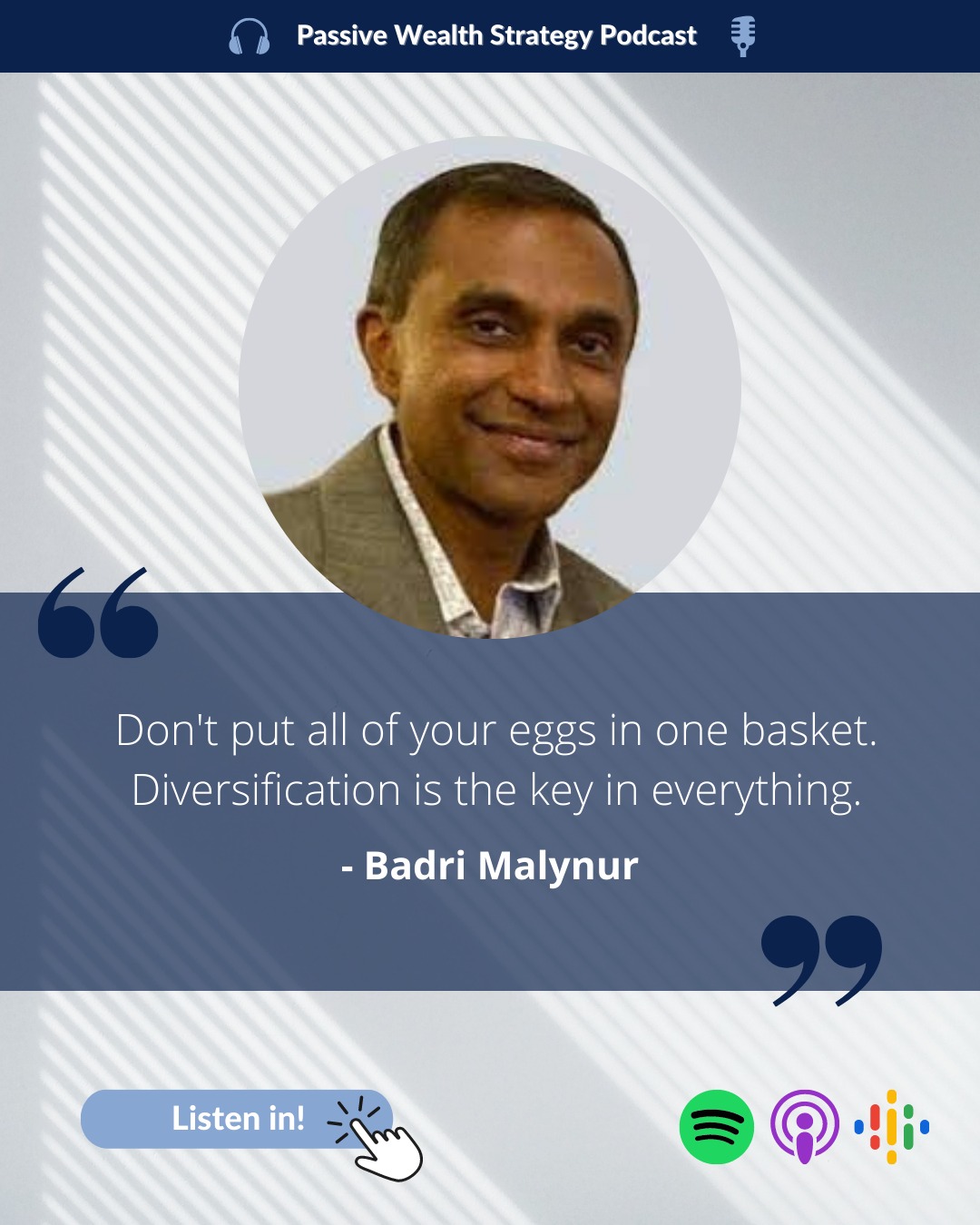
Don't put all of your eggs in one basket. Diversification is the key in everything.
Badri Malnyur Tweet
But it, I think it’s very important that you bring the VC on at the right stage of your company. Me, otherwise you’ll just end up giving control. and fortunately, we have been fortunate that we have been we have had the resources to self-fund the companies so far, so we are already on track. We have about 15 sponsors, so who have signed up and we hope to have more than a hundred sponsors by the end of this year.
And we just need a little seed round to accelerate marketing and they fund. Deployment efforts. And then, but once we come to series a then we are planning to switch to investor marketing for that. You need lots of dollars, right? You’re competing with people who are very well funded Interesting.
Very cool. Very cool to get the inside scoop on that. I love it. And I appreciate it. What you guys are doing. And like I said, I’m quite certain, I know people who have used Ave to build their funds. Thank you, Taylor.
Great. Great to be on your show.
Yeah, it’s been great talking with you right now.
We’re gonna take a quick break for our sponsor. All right. Bori, I’ve got three questions. I ask every guest at the end of the show. Ready? Go for it. Tele. Great. First one. What is the best investment you ever made other than in your education?
I was about to say my education, but we’ll go with something other than education.
We. Ava has a model, which evaluates hundreds of deals. And we are proud to say the model is working. We recently had an exit this was a student housing in Atlanta and the projected return was about 20%, but we ended up getting 45% IRR whoa, and a hundred dollars invested was an equity multiple of two and a half.
So in two and a half years, a hundred dollars became almost two $60. So that was a good investment. Not only for us. But for also a lot of the investors who invested in the fund initially, I would say that’s my best investment. Awesome. Just in terms of return and also the fact that it is strategically important for us.
It’s not just the money you made in the investment, but it’s also the fact, the initial investments. Investors were excited. They’re putting more money in the fund and it’s a good track recorder to have.
Yeah, and demonstrates a very viable product for Ave. Nice. We had the best investment.
Now we go to the other side of that coin, the worst investment. What is the worst investment you ever made?
Okay. Ironically, the worst investment was in some ways the worst investment, in some ways, it was the best investment. So let me tell you why. It was an option strategy, which I involved selling index stock options was doing spectacularly well, and there were years where I was doubling my money.
And then COVID came. And I dunno if you’re familiar with volatility and the index, it shot out of the roof. And the fund got wiped out. A lot of the gains I lost, but I still considered that one of my best in investments because I learned so much. and I learned the importance of diversification.
So it was the worst investment in terms of that particular year’s returns. But I learned a lot from that investment and it was very fun. It was a lot of fun developing that strategy,
As long as you could turn a negative into a positive, then there you go. Some benefit. My favorite question here at the end of the show is what is the most important lesson you’ve learned in business and investing.
I’ll tell you what, I’ll go back to what my grandma told me. she didn’t use those same words, but it’s something similar to this, right? It boils down to don’t putting all your eggs in one basket. It doesn’t matter how good the basket is. It doesn’t matter if the basket is lined with the golden lining, diversification is key in everything.
You do everything, right? Whether it’s investing, whether it’s business. People think, oh, I got this right. I, this is the deal. Don’t do that. Always follow a borrow approach where you have a spectrum of investments decide, I call these different buckets, right? That is the lottery ticket bucket. And there is the risky bucket.
Then there is the safe bucket. And then there is the sleep at night bucket. Do you know what I mean? Decide what you want in each bucket and make sure you’re not exceeding that bucket size. That’s the pace of advice I would have. For example, the lottery ticket bucket might be crypto or an extremely risky startup, or, and then the risky bucket might be individual stocks and somewhat safe bucket might be bonds and index funds and A very safe bucket might be your DC insured thing and a life insurance policy. And I mean that tons of other examples. So diversification is very, is important. And don’t put all your eggs in one basket.
Nice diversification. And I feel like discipline is another part of adolescence.
Absolutely. Absolutely. And ensuring that you don’t get carried away. That part of the day.
Great. Thank you so much for joining us today and thank you for what you’re doing out there and for helping people escape the wall street casino.
If folks want to reach out, if they wanna learn more about you or your platform, where can they track you down?
I will give you my cell number and my email address. So there is a lot more information on our website. It’s Aster, inc.com a V E S T O R I N c.com. I love talking to people feel free to reach out and call me on myself.
(503) 860-8374. Or you can also say me an email to Bre B a D R I Aster, inc.com a V E St O R. I do com.
Awesome. Thank you once again for joining us today to everybody out there. Thank you for tuning in. If you’re enjoying the show, please leave us a rating and review on the apple podcast. Five stars. If you don’t mind, guys, I appreciate that so much that helps other people learn about the show, because that helps us Frank hire in the apple podcast ecosystem.
And I’m always honest with you guys that gives me a nice little warm and fuzzy feeling because I get to the seed. That you’re engaging with the content and you’re escaping the wall street casino along with us. If you know anyone who could use a little bit more passive wealth in their lives, please share the show with them and bring them into the tribe.
I hope you have a great rest of your day and we’ll talk to you on the next one. Bye. Bye.

How Passive Syndication Investors can Diversify through Technology
About our Guest

Badri Malynur
Badri Malynur has over 20 years of experience in multi-family housing. He was a co-founder in two previous start-ups, an active angel investor and has held key leadership positions at a Fortune 500 company for over 15 years.
His MBA in Marketing & Finance and his Masters in Computer Science provide him with a unique perspective on how technology can be applied to real estate.
Episode Show Notes
Badri has over 20 years of experience in multi-family housing. He was a co-founder in two previous start-ups, an active angel investor, and has held key leadership positions at a Fortune 500 company for over 15 years. His MBA in Marketing & Finance and his Masters in Computer Science provide him with a unique perspective on how technology can be applied to real estate.
[00:01 – 07:43] Opening Segment
- Get to know Badri Malynur
- Badri shares with us his life and investor background
- The secret sauce is customization!
[07:44 – 13:41] How to Diversify Your Portfolio
- Diversify deals by starting with K-1s
- Customizable Fund Idea
- Develop a new product
- Don’t say ‘no’ to a sponsor
[13:42 – 21:22] How Passive Syndication Investors can Diversify through Technology
- Badri tackles the KPIs from the sponsorship side of things
- Badri’s transition from corporate to real estate
- Insights on venture capitals
[21:23 – 28:51] Closing Segment
- Quick break for our sponsors
- The first step to growing your wealth is tracking your wealth, income spending and everything else about your finances, you can start tracking your wealth for free and get six free months of wealth advisor. Learn more about Personal Capital at www.escapingwallstreet.com
- What is the best investment you’ve ever made other than your education?
- A model that evaluates hundreds of deals
- Badri’s worst investment
- Option Strategy
- What is the most important lesson that you’ve learned in business and investing?
- “Diversification is key in everything you do everything right.”
Connect with Badri Malynur through (503)-860-8374, [email protected], and LinkedIn. Visit their website https://www.avestorinc.com/.
Invest passively in multiple commercial real estate assets such as apartments, self storage, medical facilities, hotels and more through https://www.passivewealthstrategy.com/crowdstreet/
Participate directly in real estate investment loans on a fractional basis. Go to www.passivewealthstrategy.com/groundfloor/ and get ready to invest on your own terms.
Join our Passive Investor Club for access to passive commercial real estate investment opportunities.
LEAVE A REVIEW + help someone who wants to explode their business growth by sharing this episode or click here to listen to our previous episodes
Tweetable Quotes:
“You’re not really investing in the platform. You’re investing in LLC, which owns all the assets through the platform.” – Badri Malynur
“I’m really thankful for real estate in helping me transition from the corporate job to entrepreneurial journey.” – Badri Malynur
“Venture capitals don’t bring a certain amount of credibility and they add fuel to the fire.” – Badri Malynur

